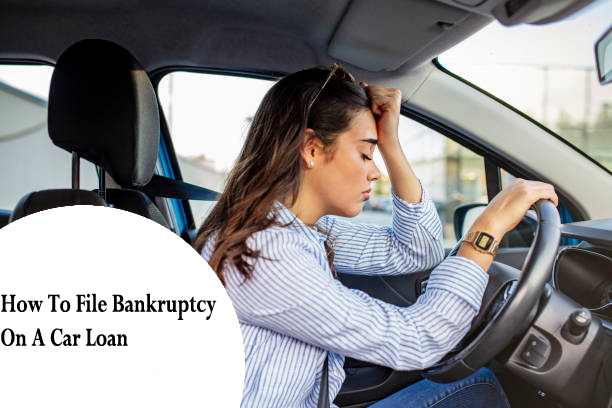How To File Bankruptcy On A Car Loan – Are you considering escaping your auto loan by filing for bankruptcy? While it might seem like an option, there are better alternatives to explore, such as debt settlement.

However, it’s important to note that these options may not allow you to retain your car, fully discharge your debt, or facilitate easy repayment. But if you’d still like to be enlightened on this, we implore you to stick with us till the end of this blog post.
What Is Bankruptcy On An Auto Loan?
Bankruptcy on an auto loan occurs when a person is unable to repay the debt associated with their car loan and seeks legal protection through bankruptcy proceedings, potentially resulting in the loss of the vehicle or restructuring of payment terms.
How Does The Process Work?
Bankruptcy on an auto loan works by allowing individuals who are unable to repay their car loans to seek relief through the legal process of bankruptcy. Here’s how it generally works:
Upon filing for bankruptcy with the court, indicating their inability to repay debts, including the auto loan, an automatic stay goes into effect, halting all collection actions by creditors, including repossession of the vehicle.
Depending on the type of bankruptcy filed, different procedures apply. In Chapter 7, a liquidation bankruptcy, non-exempt assets are sold to repay creditors. The debtor may have the option to surrender the vehicle, reaffirm the debt (agree to continue making payments), or redeem the vehicle by paying its current market value.
On the other hand, Chapter 13, a reorganization bankruptcy, involves creating a repayment plan to pay off debts over three to five years. The debtor may be able to keep the vehicle and catch up on missed payments through the repayment plan.
If the debtor reaffirms the debt, they continue making payments on the auto loan and retain the vehicle. If they surrender the vehicle, the debt is discharged in bankruptcy, and the lender repossesses the car.
Bankruptcy on an auto loan can significantly impact the debtor’s credit score, making it more challenging to obtain credit in the future. Therefore, it’s advisable for individuals considering bankruptcy to seek guidance from a bankruptcy attorney or financial advisor to understand their options and navigate the process effectively.
Does Bankruptcy Affect My Credit Score?
Both forms of bankruptcy can significantly damage and impact your credit score. Chapter 7 bankruptcy can remain on your credit history for up to 10 years, while Chapter 13 bankruptcy can last for 7 years.
During this time, any entities legally entitled to view your credit score, such as utility companies, creditors, landlords, or lenders, will see the bankruptcy on your credit reports. As a consequence, you may encounter denials for credit card or loan applications.
Even if you are approved, you’ll likely face high-interest rates and fees due to the increased risk associated with your credit history.
Can I Keep My Car If I File for Bankruptcy On A Car Loan?
This is a common question among car owners contemplating bankruptcy. If the equity in your car is $4,450 or less, you may have a chance to retain ownership of your vehicle after filing for bankruptcy.
Additionally, you might qualify to claim the federal exemption during the process, further aiding in retaining your car.
However, it’s important to note that failure to make payments on missed repayments could lead to your lender repossessing the loan during bankruptcy proceedings.
How To File Bankruptcy On A Car Loan
As mentioned before, filing for bankruptcy because of a car loan isn’t a good idea. It can hurt your credit score and the things you own. That’s why it’s important to understand how it works before you do it.
If you do file for bankruptcy, the stuff you own might have to be sold to pay off what you owe. And remember, bankruptcy stays on your credit history for either 7 or 10 years, depending on the type.
But if you still want to go through with it, here’s what you need to do:
- Contact a lawyer who will recommend the most suitable bankruptcy that will work for you.
- Go for credit counseling.
- Make a list of your loans and include your cars.
In the end, if the bankruptcy court gives you a discharge, you no longer have to pay the listed loans. Also, creditors will not seize or collect anything from you to pay up the debts.
How To Protect Your Car After Filing
If you want to protect your car after filing for bankruptcy. It’s a good idea to try paying off your auto loan before starting the process.
Additionally, you can file for a federal exemption during bankruptcy proceedings to protect any vehicle you own. If your car’s value is under $4,450, you can keep it.
In a Chapter 7 bankruptcy, you may have the option to sign a reaffirmation agreement. This agreement commits you to continue your car loan payments as if bankruptcy hadn’t happened. This allows you to keep the car and make regular monthly payments on the loan.



